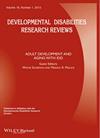Chris Feudtner, Jeffrey P. Brosco
{"title":"智障人士需要特殊的人类受试者研究保护吗?历史、伦理和政策的相互作用","authors":"Chris Feudtner, Jeffrey P. Brosco","doi":"10.1002/ddrr.139","DOIUrl":null,"url":null,"abstract":"<p>People with intellectual disability (ID) have a long history of discrimination and stigmatization, and a more recent history of pride and self-advocacy. The early history suggests that people with ID are a vulnerable population and deserve special research protections as do some other groups; the disability rights movement of the late 20th century aligns people with ID more closely with the principle of autonomy that has guided clinical and research ethics for the last 40 years. In examining the history of people with ID and the prevailing framework of human subjects research protections in the United States, we conclude that people with ID do not require special protection in human subjects research. The protections that have already been put in place for all individuals, if conscientiously and effectively implemented, achieve the right balance between safeguarding the interest of human research subjects and empowering individuals who choose to do so to participate in research. © 2012 Wiley Periodicals, Inc. Dev Disabil Res Rev 2011; 17:52–56.</p>","PeriodicalId":55176,"journal":{"name":"Developmental Disabilities Research Reviews","volume":"17 1","pages":"52-56"},"PeriodicalIF":0.0000,"publicationDate":"2012-03-23","publicationTypes":"Journal Article","fieldsOfStudy":null,"isOpenAccess":false,"openAccessPdf":"https://sci-hub-pdf.com/10.1002/ddrr.139","citationCount":"10","resultStr":"{\"title\":\"Do people with intellectual disability require special human subjects research protections? The interplay of history, ethics, and policy\",\"authors\":\"Chris Feudtner, Jeffrey P. Brosco\",\"doi\":\"10.1002/ddrr.139\",\"DOIUrl\":null,\"url\":null,\"abstract\":\"<p>People with intellectual disability (ID) have a long history of discrimination and stigmatization, and a more recent history of pride and self-advocacy. The early history suggests that people with ID are a vulnerable population and deserve special research protections as do some other groups; the disability rights movement of the late 20th century aligns people with ID more closely with the principle of autonomy that has guided clinical and research ethics for the last 40 years. In examining the history of people with ID and the prevailing framework of human subjects research protections in the United States, we conclude that people with ID do not require special protection in human subjects research. The protections that have already been put in place for all individuals, if conscientiously and effectively implemented, achieve the right balance between safeguarding the interest of human research subjects and empowering individuals who choose to do so to participate in research. © 2012 Wiley Periodicals, Inc. Dev Disabil Res Rev 2011; 17:52–56.</p>\",\"PeriodicalId\":55176,\"journal\":{\"name\":\"Developmental Disabilities Research Reviews\",\"volume\":\"17 1\",\"pages\":\"52-56\"},\"PeriodicalIF\":0.0000,\"publicationDate\":\"2012-03-23\",\"publicationTypes\":\"Journal Article\",\"fieldsOfStudy\":null,\"isOpenAccess\":false,\"openAccessPdf\":\"https://sci-hub-pdf.com/10.1002/ddrr.139\",\"citationCount\":\"10\",\"resultStr\":null,\"platform\":\"Semanticscholar\",\"paperid\":null,\"PeriodicalName\":\"Developmental Disabilities Research Reviews\",\"FirstCategoryId\":\"1085\",\"ListUrlMain\":\"https://onlinelibrary.wiley.com/doi/10.1002/ddrr.139\",\"RegionNum\":0,\"RegionCategory\":null,\"ArticlePicture\":[],\"TitleCN\":null,\"AbstractTextCN\":null,\"PMCID\":null,\"EPubDate\":\"\",\"PubModel\":\"\",\"JCR\":\"\",\"JCRName\":\"\",\"Score\":null,\"Total\":0}","platform":"Semanticscholar","paperid":null,"PeriodicalName":"Developmental Disabilities Research Reviews","FirstCategoryId":"1085","ListUrlMain":"https://onlinelibrary.wiley.com/doi/10.1002/ddrr.139","RegionNum":0,"RegionCategory":null,"ArticlePicture":[],"TitleCN":null,"AbstractTextCN":null,"PMCID":null,"EPubDate":"","PubModel":"","JCR":"","JCRName":"","Score":null,"Total":0}
引用次数: 10

 求助内容:
求助内容: 应助结果提醒方式:
应助结果提醒方式:


